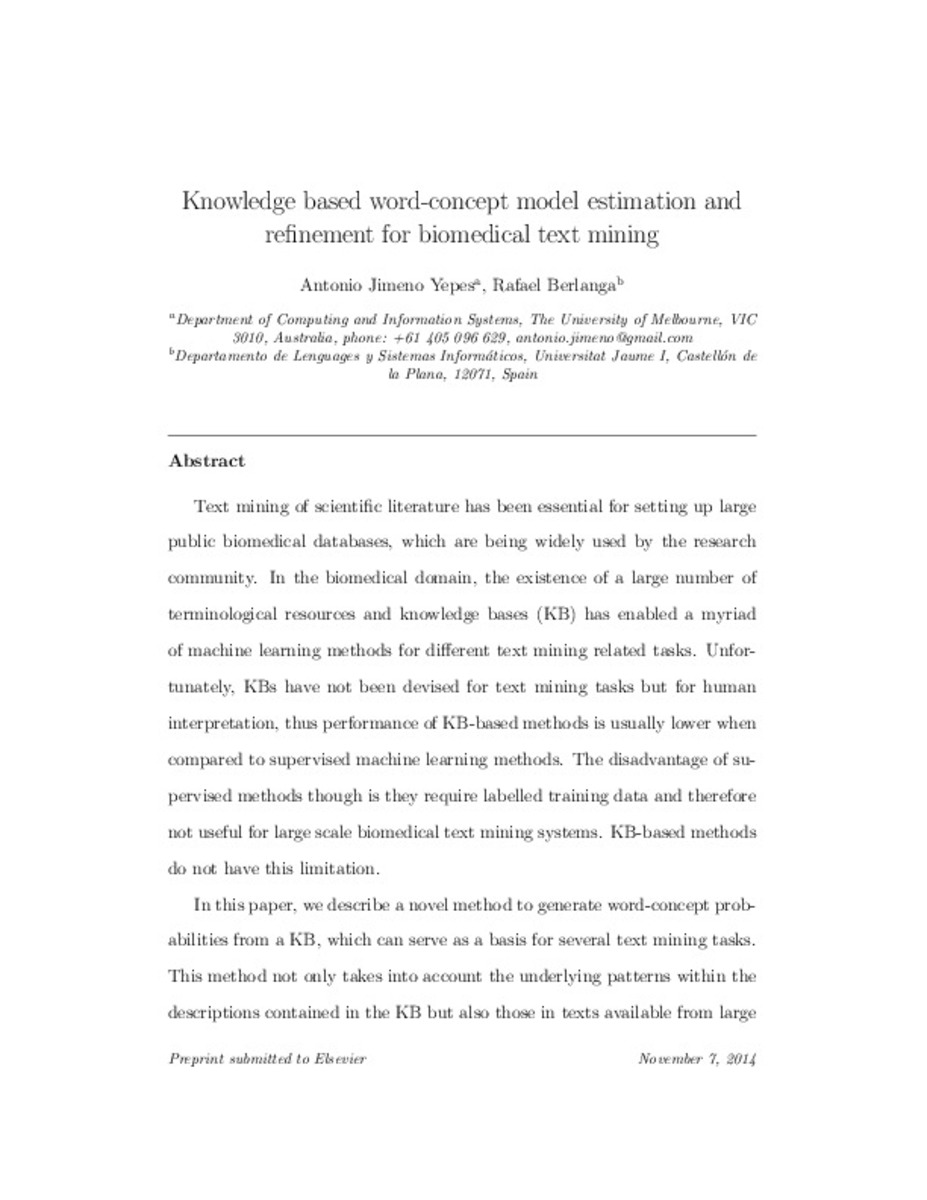Mostrar el registro sencillo del ítem
Knowledge based word-concept model estimation and refinement for biomedical text mining
| dc.contributor.author | Jimeno Yepes, Antonio José | |
| dc.contributor.author | Berlanga Llavori, Rafael | |
| dc.date.accessioned | 2016-02-22T10:05:58Z | |
| dc.date.available | 2016-02-22T10:05:58Z | |
| dc.date.issued | 2014-12 | |
| dc.identifier.citation | YEPES, Antonio Jimeno; BERLANGA, Rafael. Knowledge based word-concept model estimation and refinement for biomedical text mining. Journal of biomedical informatics, 2015, 53: 300-307. | ca_CA |
| dc.identifier.uri | http://hdl.handle.net/10234/150910 | |
| dc.description.abstract | Text mining of scientific literature has been essential for setting up large public biomedical databases, which are being widely used by the research community. In the biomedical domain, the existence of a large number of terminological resources and knowledge bases (KB) has enabled a myriad of machine learning methods for different text mining related tasks. Unfortunately, KBs have not been devised for text mining tasks but for human interpretation, thus performance of KB-based methods is usually lower when compared to supervised machine learning methods. The disadvantage of supervised methods though is they require labeled training data and therefore not useful for large scale biomedical text mining systems. KB-based methods do not have this limitation. In this paper, we describe a novel method to generate word-concept probabilities from a KB, which can serve as a basis for several text mining tasks. This method not only takes into account the underlying patterns within the descriptions contained in the KB but also those in texts available from large unlabeled corpora such as MEDLINE. The parameters of the model have been estimated without training data. Patterns from MEDLINE have been built using MetaMap for entity recognition and related using co-occurrences. The word-concept probabilities were evaluated on the task of word sense disambiguation (WSD). The results showed that our method obtained a higher degree of accuracy than other state-of-the-art approaches when evaluated on the MSH WSD data set. We also evaluated our method on the task of document ranking using MEDLINE citations. These results also showed an increase in performance over existing baseline retrieval approaches. | ca_CA |
| dc.description.sponsorShip | The work was supported by the CICYT Project TIN2011–24147 from the Spanish Ministry of Economy and Competitiveness (MINECO). | ca_CA |
| dc.format.extent | 37 p. | ca_CA |
| dc.format.mimetype | application/pdf | ca_CA |
| dc.language.iso | eng | ca_CA |
| dc.publisher | Copyright © 2014 Elsevier Inc. | ca_CA |
| dc.relation.isPartOf | Journal of biomedical informatics, 2015, 53: 300-307 | ca_CA |
| dc.rights | Copyright © 2014 Elsevier Inc. | ca_CA |
| dc.rights.uri | http://rightsstatements.org/vocab/InC/1.0/ | * |
| dc.subject | word-concept probability | ca_CA |
| dc.subject | text mining | ca_CA |
| dc.subject | word sense disambiguation | ca_CA |
| dc.subject | information retrieval | ca_CA |
| dc.subject | biomedical literature | ca_CA |
| dc.title | Knowledge based word-concept model estimation and refinement for biomedical text mining | ca_CA |
| dc.type | info:eu-repo/semantics/article | ca_CA |
| dc.identifier.doi | 10.1016/j.jbi.2014.11.015 | |
| dc.rights.accessRights | info:eu-repo/semantics/openAccess | ca_CA |
| dc.relation.publisherVersion | http://www.sciencedirect.com/science/article/pii/S1532046414002676 | ca_CA |
| dc.edition | Preprint, versió de l'autor | ca_CA |
| dc.type.version | info:eu-repo/semantics/submittedVersion |
Ficheros en el ítem
Este ítem aparece en la(s) siguiente(s) colección(ones)
-
LSI_Articles [362]
Articles de publicacions periòdiques escrits per professors del Departament de Llenguatges i Sistemes Informàtics







